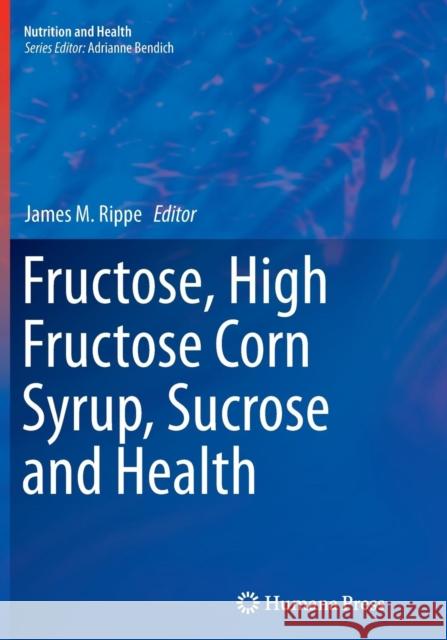Fructose, High Fructose Corn Syrup, Sucrose and Health » książka



Fructose, High Fructose Corn Syrup, Sucrose and Health
ISBN-13: 9781493955190 / Angielski / Miękka / 2016 / 379 str.
Fructose, High Fructose Corn Syrup, Sucrose and Health
ISBN-13: 9781493955190 / Angielski / Miękka / 2016 / 379 str.
(netto: 421,70 VAT: 5%)
Najniższa cena z 30 dni: 424,07
ok. 16-18 dni roboczych.
Darmowa dostawa!
From the book reviews:
"The book is divided into 5 sections: An Overview, a focus on the global perspectives, on the functional effects of sugars, on sugars and health and on sugars in chronic disease. ... this book is an essential addition to the library shelves of universities, food companies and governmental organisations." (Mike J. Gibney, Frontiers in Nutrition, November, 2014)Section A: Overviews
Ch.1: Fructose, High Fructose Corn Syrup, Sucrose, and Health: Modern Scientific Understandings
James M. Rippe, M.D.
Ch. 2: Sucrose, HFCS, and Fructose: History, Manufacture, Composition, Applications, and Production
John S. White, Ph.D.
Ch. 3: Metabolism of Nutritive Sweeteners in Humans
Luc Tappy, M.D., Leonie Egli, MSc, Christel Tran, MD
Ch. 4: Solid Versus Liquid Calories: Current Scientific Understandsings
Joshua B. Jones, Janice Lee, Richard D. Mattes
Ch. 5: Non-Nutritive Sweeteners
John D. Fernstrom, Ph.D.
Section B: Global Perspectives
Ch. 6: Worldwide Consumption of Sweeteners and Recent Trends
Bernadette P. Marriott, Ph.D., Christopher Fink, Terri Krakower, Ph.D.
Ch. 7: Added Sugars and Health: Evidence from Prospective Cohort Studies and Controlled Dietary Trials
John L. Sievenpiper, M.D., Ph.D.
Ch. 8: Crystalizing Global Sugar Policy: Public Promise or Perception
Roger Clemens, Dr.P.H., U.S.C., Yanni Papanikolaou, Ph.D.
Ch. 9: Evolution of High Fructose Corn Syrup within the Sweeteners Industry
John W. Bode, Mark W Empie, Kyd D. Brenner
Section C: Functional Effects
Ch. 10: Sweeteners and Dietary Quality
Rosanne Rust, M.S., R.D.N., L.D.N.
Ch. 11: The Effects of Sweeteners on Energy Regulating Hormones
James M. Rippe, M.D.
Ch. 12: Sweeteners and the Brain
Athylia Paremski, Miguel Alonso-Alonso
Ch. 13: Are Sugars Addictive? Perspectives for Practitioners
Rebecca L. W. Corwin, John E. Hayes
Section D: Sweeteners in Healthy Populations
Ch. 14: Sugar Intake in Children and Adolescents in Effects on Health
Craig A. Johnston, Ph.D., John P. Foreyt, Ph.D.
Ch. 15: Flavored Milk, Dietary Quality, And Childhood Nutrition
Kristine Clark, Ph.D., R.D., James M. Rippe, M.D.
Ch. 16: Childhood Obesity and the Consumption of 100% Fruit Juice: Where are the Evidence-Based Findings?
Carole E. O’Neil, Theresa A. Nicklas
Ch. 17: Sugar Sweetened Beverages and Hydration
Matthew S. Ganio, Ph.D., Matthew A. Tucker, M.A.
Ch.18: Sugar, Sports Drinks, and Performance
Robert Murray, Ph.D. F.A.C.S.M.
Section E : Sweeteners in Chronic Disease
Ch. 19: Sweeteners and Diabetes
Adrian I Cozma, Ha V. Jayalath VH, De Souza RJ, John L. Sievenpiper
Ch. 20: Fructose, High Fructose Corn Syrup, Sucrose and Non-Alcoholic Fatty Liver Disease
Mei Chung, Ph.D., M.P.H., Alice H. Lichtenstein, Sc.D.
Ch. 21: Sugars and Cardiovascular Disease
James M. Rippe, M.D.
Dr. Rippe is a graduate of Harvard College and Harvard Medical School with post graduate training at Massachusetts General Hospital. He is currently the Founder and Director of the Rippe Lifestyle Institute, Associate Professor of Medicine (Cardiology) at Tufts University School of Medicine and Professor of Biomedical Sciences at the University of Central Florida. Over the past 20 years Dr. Rippe has established and run the largest research organization in the world exploring how daily habits and actions impact short and long-term health and quality of life. This organization, Rippe Lifestyle Institute (RLI) has published hundreds of studies that form the scientific basis for the fields of lifestyle medicine and high performance health. Rippe Lifestyle Institute also conducts numerous studies every year on nutrition and healthy weight management. Dr. Rippe also serves as the Chairman of the Center for Lifestyle Medicine at the University of Central Florida (CLM at UCF). The CLM at UCF is the first University based organization to conduct basic research and teach students at all levels in the area of lifestyle medicine. The CLM at UCF is located in a state-of-the-art 8,000 square foot facility in the Research Park adjacent to the UCF campus. Dr. Rippe leads a team of UCF faculty conducting basic research in all aspects of lifestyle medicine at the CLM at UCF.
The metabolic and health effects of both nutritive and non-nutritive sweeteners are controversial, and subjects of intense scientific debate. These potential effects span not only important scientific questions, but are also of great interest to media, the public and potentially even regulatory bodies. Fructose, High Fructose Corn Syrup, Sucrose and Health serves as a critical resource for practice-oriented physicians, integrative healthcare practitioners, academicians involved in the education of graduate students and post-doctoral fellows, and medical students, interns and residents, allied health professionals and nutrition researchers, registered dietitians and public health professions who are actively involved in providing data-driven recommendations on the role of sucrose, HFCS, glucose, fructose and non-nutritive sweeteners in the health of their students, patients and clients. Comprehensive chapters discuss the effects of both nutritive and non-nutritive sweeteners on appetite and food consumption as well as the physiologic and neurologic responses to sweetness. Chapter authors are world class, practice and research oriented nutrition authorities, who provide practical, data-driven resources based upon the totality of the evidence to help the reader understand the basics of fructose, high fructose corn syrup and sucrose biochemistry and examine the consequences of acute and chronic consumption of these sweeteners in the diets of young children through to adolescence and adulthood.
Fructose, High Fructose Corn Syrup, Sucrose and Health fills a much needed gap in the literature and will serve the reader as the most authoritative resource in the field to date.
1997-2026 DolnySlask.com Agencja Internetowa
KrainaKsiazek.PL - Księgarnia Internetowa









